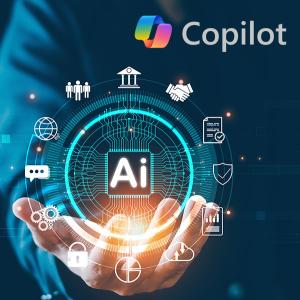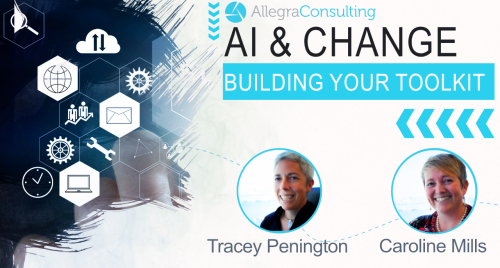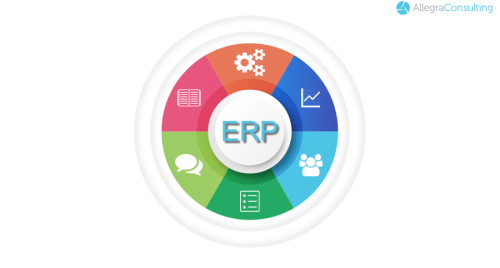
Integrating AI into your organisation is an exciting and transformative step, offering innovative capabilities to propel your business to new heights. Getting the best out of a successful AI integration, whether it’s generative AI like Microsoft Co-Pilot or other cutting-edge technologies, requires a thoughtful and strategic approach. At the heart of this strategy lies effective change management.
The Role of Change Management in AI Integration
AI solutions, no matter how advanced, aren’t self-sufficient. They require your employees to engage with them, adjust to new workflows, and maximise the potential benefits. Organisations risk experiencing resistance, fatigue, or failure in their AI implementation efforts without a comprehensive change management plan.
Change management helps align AI capabilities with your organisation's objectives, ensuring that new technologies are adopted and embraced. By managing this transition thoughtfully, you’ll mitigate risks, maintain employee morale, and achieve better business outcomes.
Here is how ChatGPT compares previous AI technology and new AI technology
In the past, AI technologies were like traditional paper maps - static, limited to the information they were initially given, and requiring users to chart their path manually without any feedback on traffic conditions or road changes. Users had to rely heavily on their interpretation and often needed prior knowledge to use these maps effectively.
Today's AI technologies are more like GPS navigation systems with real-time updates. They guide you on the best route based on current conditions, learn from continuous data inputs, predict potential issues, and suggest alternate routes to optimise your journey.
Why Change Management is Essential
AI is more than just technology; it represents a shift in how people work and make decisions. Here's why a solid change management strategy is key to unlocking AI's full potential:
Minimising Resistance
New technology often meets with hesitation or fear from employees who worry about job displacement, increased workloads, or learning new tools. There is also a school of thought that particularly generative AI (using large language models) will 'dumb down' humans. A well-crafted change management plan identifies and addresses these concerns early through clear communication, training, and stakeholder engagement.
Ensuring Alignment with Business Goals
AI integration should be driven by your business needs, not just technology for technology's sake. Change management ensures that AI is introduced to support your long-term objectives, whether streamlining operations, enhancing customer service, or fostering innovation rather than just new technology for new technology’s sake.
Driving Adoption
AI must be adopted widely across the organisation to deliver its promised benefits. Everyone must understand how to use it and the benefits for them personally (the WIIFM, as we talk about in change). Change management creates a roadmap for employee engagement, helping teams see the tangible value AI brings to their daily work.
Key Elements of a Successful Change Management Strategy
At Allegra, we focus on guiding organisations through every phase of AI integration, from designing and delivering to sustaining the change. Here are some key aspects of our approach:
Igniting Initial Sparks - Demonstrating Value Early
Early success stories (use cases) and early adopters drive momentum. We work with you to identify pilot use cases where AI can deliver quick wins across your most passionate teams, helping to build trust and excitement across the organisation.
Stakeholder Engagement
We identify key stakeholders and craft strategies to gain buy-in and manage resistance. This includes leadership alignment, finding executive sponsorship, ensuring visible support for the initiative, and providing employees with a clear understanding of how AI will impact their roles.
Clear Communication & Upskilling
A well-defined communication plan is essential to keep everyone on the same page. Working with your channels, we find creative ways (gamification, infographics, virtual reality, storytelling) to ensure your teams understand and can use the new ways of working.
Proactive Messaging around Risk Management
From data security concerns to operational disruptions, we help you identify and address potential risks before they become issues. Managing people’s concerns around AI can create a smoother transition and reduce resistance.
AI Integration Across Different Industries
AI has applications across a wide range of industries, but each sector presents its own set of challenges. Here’s how change management can make a difference:
Finance
Balancing innovation with regulatory compliance is critical in financial services. Our approach ensures AI tools like Co-Pilot are seamlessly integrated while maintaining stringent security and accuracy standards.
Manufacturing
In manufacturing, AI can revolutionise production processes. We focus on aligning employees with AI-driven workflows and fostering a culture of innovation.
Energy
AI can optimise asset management and operational efficiency in the energy sector. Our change management approach ensures clear communication and stakeholder engagement, smoothing the transition from legacy systems to AI-powered processes.
AI integration is an emerging field, and as such, it comes with a lot of preconceptions and uncertainty regarding how it will impact your organisation's operation. Change management plays a crucial role in ensuring that AI doesn’t just sit on the shelf but becomes an integral part of your business, driving real value adopted by your people. With the right strategy in place, your organisation can avoid the common pitfalls of new technology.









